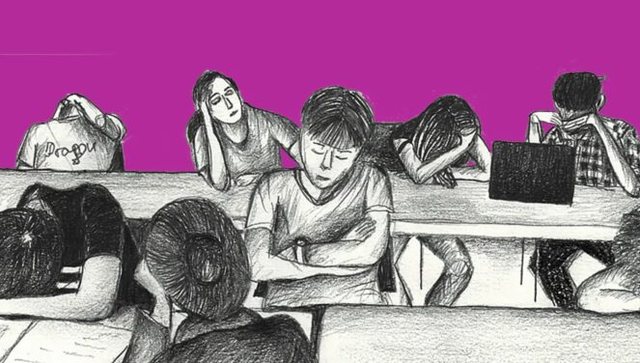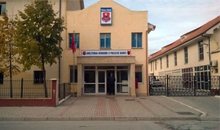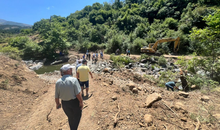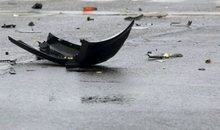
 Flash News
Flash News
Ceno Klosi with over 800 stolen votes, Balluku finds the reason is the tiredness of the counters
"Fast & Furious" in the former Block, police chase an Audi Q8, 4 cars collide
Car hits two tourists on a motorcycle in Fushe Arrëz, one of them dies
Serious accident in Thumanë, one dead, 3 injured
Durrës Court suspends the director of Pre-University Education from duty
Albania has the lowest quality in Europe and Asia, poor education will hold two generations hostage

Albania ranks among the countries with the lowest quality of higher education in the Europe and Central Asia (ECA) region, according to the World Bank's latest report "Greater Heights, Growing to High Income in Europe and Central Asia".
If educational quality does not improve, Albania and the countries of the ECA region will not cross the upper-middle income threshold for even two generations, the Bank announces.
As can be seen in the graph below, Albania ranked at the lowest level of quality in Higher Education both in relation to the ECA Region and the rest of the world. The Bank notes that education fosters talent, which then guarantees prosperity.
In the ECA region, which includes Albania, the probability of children being more educated than their parents has decreased. However, one positive point is that the likelihood of children pursuing higher education, even if their parents did not, has increased.
The World Bank advises that primary and secondary education should provide basic skills, while higher education institutions should produce innovators, thus strengthening creative forces.
The quality of primary and secondary education, as measured by the Programme for International Student Assessment (PISA) scores for 15-year-olds, has been declining, a trend that began before the Covid-19 pandemic and has been exacerbated by it. Over the past decade, PISA mathematics scores in the ECA region, which includes Albania, have fallen by the equivalent of a full year of schooling.
The Bank considers that one of the most pressing issues in the region is the effectiveness of vocational education and training. Almost 45% of secondary and higher education students in the region, and up to 80% in some countries, are directed towards vocational education from the beginning of their school careers. In Albania, vocational education is attended by only 17% of students.
But while vocational education programs are often promoted as a valuable path to improving employability, they often fail to equip students with the skills needed to succeed in a rapidly changing job market.
The situation is even more dire in universities. The quality of higher education is lower than expected. In countries like Albania, a diploma is more important than acquiring knowledge or skills.
Given that individuals with higher education are more likely to become innovators, the poor quality of university education poses an existential risk to the region's long-term growth prospects.
In the Times Higher Education world university rankings, only one university from the region is among the top 100, and only nine universities are ranked among the top 500. Albania is not included in any of these rankings, further worsening the country's position.
The World Bank notes that some of the main causes of low quality higher education include:
First, academic capture (when universities prioritize political or vested interests over academic excellence), insufficient funding, outdated curricula, lack of modern infrastructure, and the over-proliferation of higher education institutions.
Secondly, talent is not developed solely through the education system. Societies that fail to employ talented individuals miss out on the opportunity to create a productive population, especially among women, who in the ECA region are typically better educated than men.
Without urgent action to halt the decline in the quality of education, especially in higher education, and to improve the distribution of talent in the labor market, middle-income countries (MICs) in the region will not be able to achieve high-income status within a generation or two.
The Bank advises the authorities in Albania to encourage and consider policies that improve:
• Strengthening basic skills to halt the decline in the quality of secondary education.
• Restructuring the vocational education and training (VET) system, raising the age of selection for this educational path and strengthening links with industry to ensure the development of necessary skills.
• Maintaining equal access to higher education, but implementing merit-based policies to promote successful graduation.
• Merging research centers with universities and strengthening links between universities and industry to foster innovation.
• Consolidation of universities to use resources more effectively and improve their management.
• Facilitating the wider participation of women in the labor market.
Taken from Monitor
Latest news





Lufta në Gaza/ Pse Netanyahu do vetëm një armëpushim 60-ditor, jo të përhershëm?
2025-07-02 21:56:08
US suspends some military aid to Ukraine
2025-07-02 21:40:55



Methadone shortage, users return to heroin: We steal to buy it
2025-07-02 20:57:35
Government enters oil market, Rama: New price for consumers
2025-07-02 20:43:30
WHO calls for 50% price hike for tobacco, alcohol and sugary drinks
2025-07-02 20:41:53







Israel agrees to 60-day ceasefire in Gaza, but many unanswered questions remain
2025-07-02 18:35:27
The weather in Germany is going "crazy", temperatures reach 40°C
2025-07-02 18:22:21

"Fast & Furious" in the former Block, police chase an Audi Q8, 4 cars collide
2025-07-02 17:59:25
"Birth on a tourist visa? US Embassy warns Albanians: This is prohibited!"
2025-07-02 17:48:16


BIRN: Fier recount reveals vote trafficking within open political party lists
2025-07-02 16:57:19

CEO and former director of 'Bankers Petroleum' arrested in Fier
2025-07-02 16:40:42
Car hits two tourists on a motorcycle in Fushe Arrëz, one of them dies
2025-07-02 16:33:23



Fire at the Elbasan Incinerator Landfill, Prosecution Launches Investigations
2025-07-02 15:34:54
What you need to know if you travel to a country with active volcanoes
2025-07-02 15:33:03



EU proposes 90% reduction in greenhouse gases by 2040
2025-07-02 14:50:23
Europe is burning from the heat / Italy and France are on maximum alert
2025-07-02 14:36:52

Moscow's contradictory statements: Is the friendship with Vučić breaking down?
2025-07-02 14:21:05
'I lost my battle': Sea warming is killing fishing in Albania
2025-07-02 14:08:35
Sekretet kimike që ndihmojnë në mbajtjen e mjaltit të freskët për kaq gjatë
2025-07-02 14:01:26

Denmark makes historic decision to make military service mandatory for women
2025-07-02 13:44:33
The appeal of the GJKKO leaves former judge Pajtime Fetahu in prison
2025-07-02 13:30:20
Productivity losses could reduce GDP by 1.3% as a result of extreme heat
2025-07-02 13:21:04
He abused his minor daughter, Zamir Meta is left in prison
2025-07-02 13:04:04

Waste burning in Elbasan, Alizoti: They are poisoning people and stealing money
2025-07-02 12:48:39
Civil disobedience continues in Serbia, dozens of people detained
2025-07-02 12:40:32
Rama's government was born under the sign of garbage and will end like this
2025-07-02 12:28:09
Water prices increase in the municipalities of the Elbasan region
2025-07-02 12:13:38
Civil disobedience continues in Serbia, what is happening in Belgrade?
2025-07-02 12:07:44
Serious accident in Thumanë, one dead, 3 injured
2025-07-02 11:54:42
Durrës Court suspends the director of Pre-University Education from duty
2025-07-02 11:49:27
Plenary session on Thursday, what is expected to be discussed
2025-07-02 11:36:43
Europe is burning from heat waves/ What is the 'thermal dome' phenomenon?
2025-07-02 11:26:25
Wanted by Italy for murder, 45-year-old arrested in Vlora
2025-07-02 11:19:31
Fire situation, 28 fires reported in 24 hours, 2 still active
2025-07-02 11:13:20
"Buka" file, preliminary hearing for Ahmetaj postponed to July 17
2025-07-02 11:03:30


Baçi: Belinda Balluku and Ceno Klosi, the most dangerous "gangs" in Fier
2025-07-02 10:32:09
Zamir Meta, suspected of sexually abusing his daughter, arrives in court
2025-07-02 10:21:33

Trump: Israel has agreed to a 60-day ceasefire in Gaza
2025-07-02 10:01:55
Fire continues at Elbasan landfill
2025-07-02 09:51:13

Dates to note during July, important events will occur
2025-07-02 09:31:45
The hearing for Jorgo Goro's claim is postponed
2025-07-02 09:24:19



Foreign exchange, the rate at which foreign currencies are sold and bought
2025-07-02 08:42:31

52% of pensioners did not receive full pension in 2024
2025-07-02 08:27:18
Horoscope, what do the stars have in store for you today?
2025-07-02 08:13:36
Hot weather, Wednesday brings high temperatures
2025-07-02 07:59:16
Morning Post/ In 2 lines: What mattered yesterday in Albania
2025-07-02 07:46:15
Heatwave sweeps across Europe, Spain and England record hottest June ever
2025-07-01 22:57:41






Golem and Qerret without water at the peak of the tourist season
2025-07-01 21:09:32

Euractiv: Italy-Albania migrant deal faces biggest legal challenge yet
2025-07-01 20:53:38
BIRN: Brataj and Fevziu victims of a 'deepfake' on Facebook
2025-07-01 20:44:00

Vlora by-pass, work delays and cost increases
2025-07-01 20:24:29



Milan are expected to give up on the transfer of Granit Xhaka
2025-07-01 19:41:25

